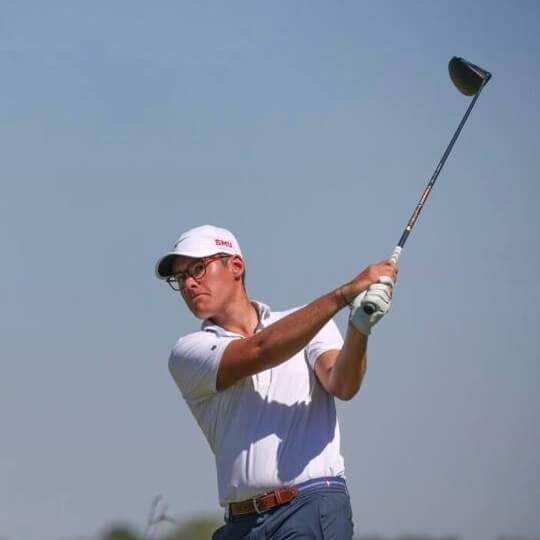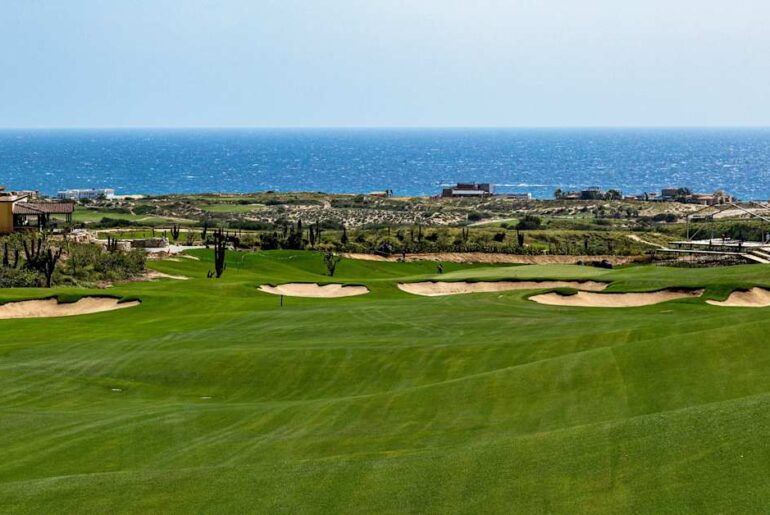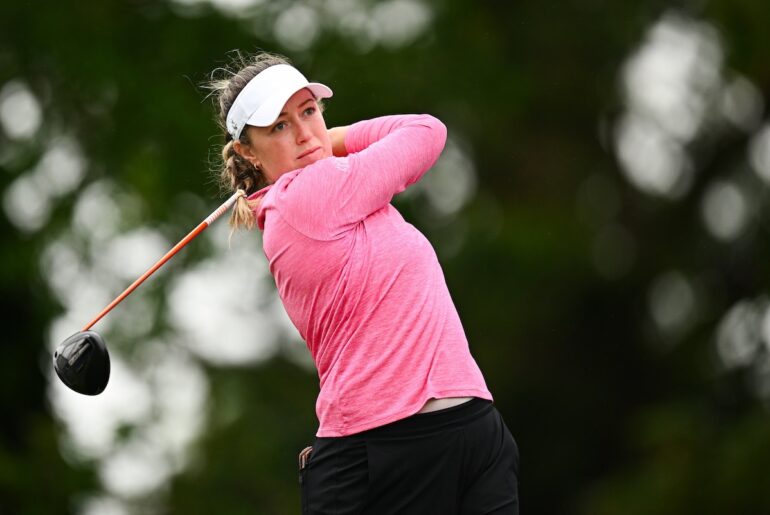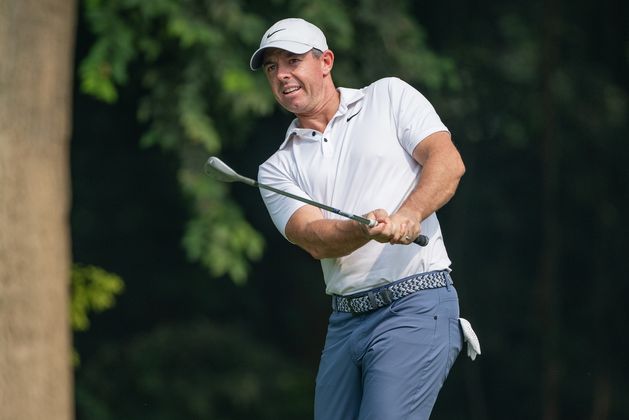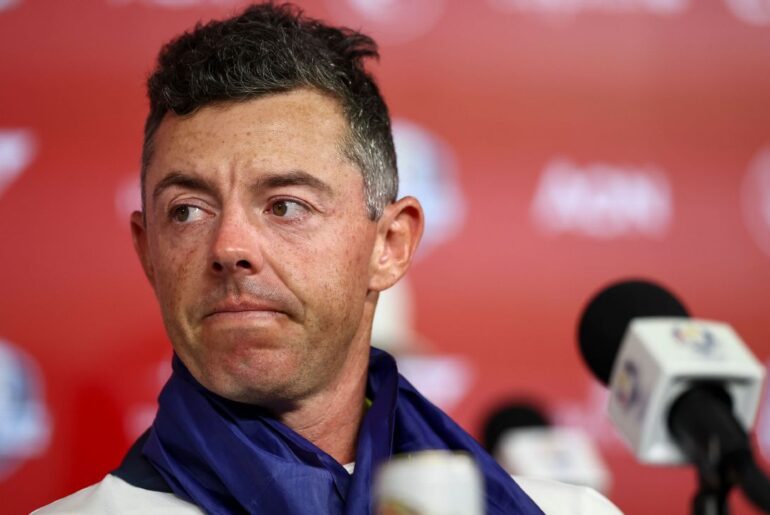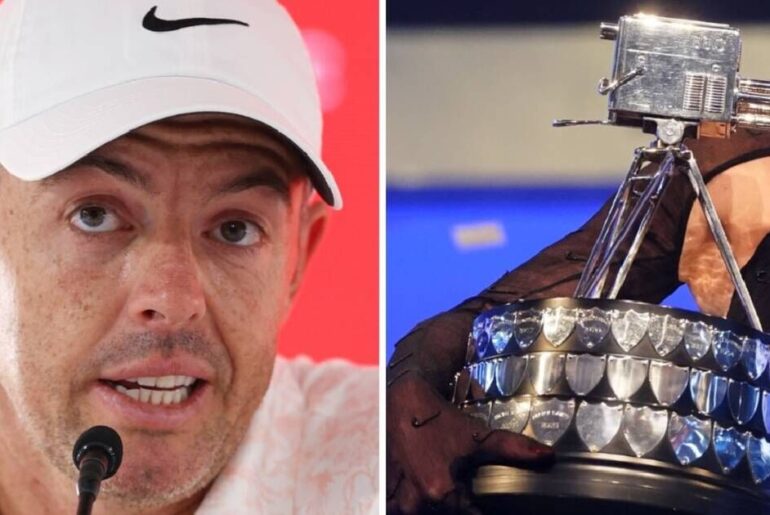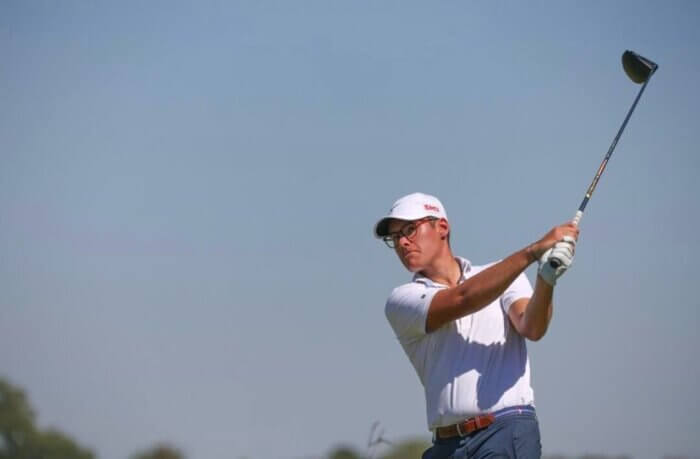 Alexis Valenzuela has vastly exceeded expectations since being diagnosed with autism at 3 years old.
Alexis Valenzuela has vastly exceeded expectations since being diagnosed with autism at 3 years old.
At 3 years old, Alexis Valenzuela was diagnosed with autism. Doctors told his parents he might never speak or attend school. Now, at 24, Valenzuela speaks three languages fluently, has a master’s degree in sports management, works in the golf industry and runs his own charity organization for autism research called Alexis for Autism.
“Sometimes I have to stop a minute and think, ‘Wow,’ ” Valenzuela said. “To think that so many years ago I couldn’t even contemplate being in this position now. It’s mind blowing.”
Valenzuela has worked hard to make sure his autism doesn’t define him. He went through about 10 years of speech, behavioral and psychotherapy to get to where he is today.
Maybe just as importantly, he has golf. His father, Alberto, was a standout player at UCLA and met his wife, Diane, through the game. Their first child is Albane Valenzuela, a three-time Swiss Olympian and LPGA Tour player for whom Alexis has caddied in both amateur and professional events.
“Golf was always the glue in our family,” Albane said. “I’m very fortunate to have him as my brother. He’s caddied for me many times before and has always been the biggest support. He’s never asked for anything in return, he’s just always happy to help. I would definitely not be this far in golf if it wasn’t for him.”

When Alexis was a toddler, Diane could tell her son was different. He wasn’t talking. He wasn’t interacting with anyone. She and Alberto decided to have Alexis tested for whatever it might be.
“When the doctors finally asked my husband and myself to go in for the result it was awful,” Diane said. “They said to us, ‘Oh, you should sit down because what we have to tell you is pretty hard.’”
The doctors told the parents that Alexis had autism. Diane was shocked and had no idea what autism meant. Where did it come from? Why her son? What does this mean for the future?
The Valenzuelas decided to do everything in their power to help their son. They were determined that the diagnosis wasn’t going to stop him.
“He’s my only son,” Alberto said. “I didn’t see him as abnormal. I just saw him as my son who was taking his time on certain things.”
Despite doctors predicting Alexis might never speak, he said his first word two years after the diagnosis. The family lived near Lake Geneva in Switzerland and the young boy loved throwing pebbles into the lake. One day, Diane asked Alexis if he wanted to throw stones. Valenzuela replied with caillou, the French word for pebble.
“He didn’t pronounce it perfectly but I was like, ‘Oh my God; he said a word,’” Diane remembered. “And of course I had a tear in my eyes.”
“It was not easy for me especially when you go to middle school and high school and not everybody knows about autism. Think about telling 14- or 15-year-old kids, ‘Oh, I have a syndrome.’ They think it’s a disease. They think they’ll get contaminated.” – Alexis Valenzuela
But there were other challenges for Alexis to overcome, including his difficulty associating with new things. When he was 7, his parents brought home a dog, whom they named Ayrton.
“We got the dog for Alexis,” Diane said. “I was told that dogs are very good with kids with autism.”
Albane loved Ayrton, but Alexis had a little more difficulty.
“For me having a dog was the coolest thing in the world,” Albane said. “But my brother didn’t acknowledge the dog. He couldn’t eat in the same room as the dog because he was totally panicked by it.”
Luckily, Alexis had “Air Bud,” a movie Alexis says he’s seen hundreds of times.
“It was a comfort movie for me,” he said.
It also proved to be a turning point in Alexis’ relationship with Ayrton and his journey with autism. In an early scene, the main character, Josh, offers a shy dog named Buddy pudding, which Buddy gratefully eats. It was the first step in creating a strong bond between boy and dog.
Alexis tried a similar approach.
“I was eating a dairy product or something and I saw the dog next to me,” he said. “He wasn’t supposed to be there and I thought, ‘Oh. There was that scene where the kid was giving him yogurt. Maybe I could try the same thing.’”
Diane couldn’t have been happier.
“I could see the sparkle in his eye,” Diane said. “I started to cry because it was the first time he had a real interaction with the dog. For me it was proof of communication and proof he knew there was a world besides [the family].”
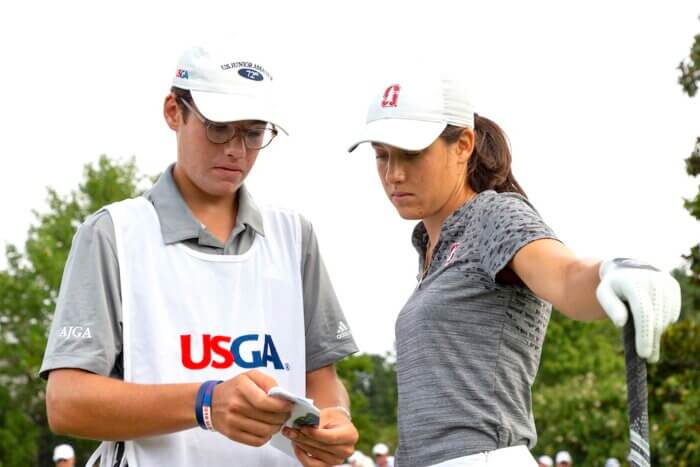 Alexis Valenzuela caddies for his sister Albane in the 2019 U.S. Women’s Amateur. Steven Gibbons, Courtesy USGA
Alexis Valenzuela caddies for his sister Albane in the 2019 U.S. Women’s Amateur. Steven Gibbons, Courtesy USGA
Alexis says he didn’t understand what autism was until he was 10, but he quickly realized ways it impacted his life.
“I’ve gone through bullying pretty badly,” he said. “It was not easy for me especially when you go to middle school and high school and not everybody knows about autism. Think about telling 14- or 15-year-old kids, ‘Oh, I have a syndrome.’ They think it’s a disease. They think they’ll get contaminated.”
Luckily, he had friends who supported him at school. He also had his family. Diane emphasized that Alexis’ differences were a strength, but others just didn’t understand that.
“I always told him that I felt he was like a knight on a horse and that he was very powerful and he could do anything in his life,” Diane said. “You have a cape on and do many things but some people don’t see that.”
Alexis also had golf. Starting very young, he developed into an accomplished junior player. In golf, he didn’t feel limited by his autism.
“I liked that there was a sort of respect in golf,” he said. “I had many friends in golf and they did not care [about my autism]. They just saw me as a good golfer.”
Meanwhile, his sister was having an impressive amateur career, eventually becoming the top-ranked amateur in Switzerland and representing her country in three Olympics. In 2016 she enrolled at Stanford, helped by a college essay she wrote about how her brother and his journey with autism shaped her own life.
“When you’re 8 and you see a sibling who has difficulties you try extremely hard to get your parents’ attention,” Albane said. “I was extremely hard working. I always tried to get A-pluses. I tried to be the best golfer. I worked really hard to be the perfect kid.”
In 2017, Alexis caddied for Albane at the U.S. Women’s Amateur at San Diego Country Club, where she defeated future world No. 1 Lilia Vu in the semifinals before losing in the final. A writer covering the tournament learned more about her 15-year-old caddie and asked Diane if she could write a story about him.
As Albane advanced in the game, Alexis started to caddie for her. Alexis says his autism is actually an advantage on the golf course because he has a photographic memory. By watching YouTube videos, he can understand exactly how a green breaks, what mistakes past golfers have made on certain shots and more.
“I could even go maybe four or five years back and remember what shot [Albane] hit on which hole at which tournament,” Alexis said. “I’m just out there trying to help her out and not put pressure on her.”
In 2017, Alexis caddied for Albane at the U.S. Women’s Amateur at San Diego Country Club, where she defeated future world No. 1 Lilia Vu in the semifinals before losing in the final. A writer covering the tournament learned more about her 15-year-old caddie and asked Diane if she could write a story about him.
In response to the request, Alexis bravely decided to share his story for the first time.
“I was very confident doing that interview but I did not expect the positive outcome it would have,” he said.
Alexis didn’t want to simply receive accolades, however. He wanted to help others in a similar situation to his.
Driven by that desire, he launched Alexis for Autism, a charity that raises money for autism research and autism-related foundations by hosting golf events. For the first event at Geneva Golf Club in June 2018, Alexis wanted to raise money for research into early detection of autism.
“I thought if I could raise $10,000 that would be amazing,” he said.
In the end, the event raised close to $400,000.
“I was very touched,” Alexis said. “I was surprised but I was mostly emotional because there were so many people willing to help me.”
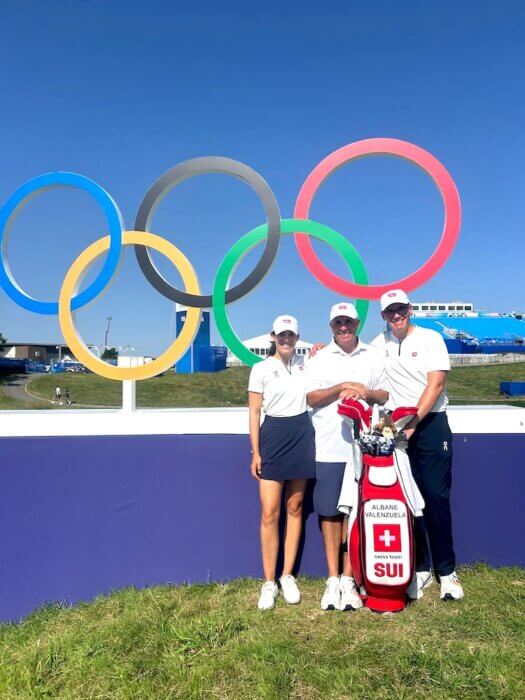 Albane, Alberto and Alexis Valenzuela at the Paris Olympics in 2024
Albane, Alberto and Alexis Valenzuela at the Paris Olympics in 2024
Albane couldn’t have been prouder.
“It was really inspirational how he took his own challenge in a positive way to support other families,” Albane said. “That makes me a proud sister.”
When it came time to apply for college, Alexis wanted to follow in Albane’s footsteps and attend Stanford. He wrote an essay about his own experience with autism but ultimately didn’t get in. Both Alexis and Albane were confused.
“He looked at me and said, ‘How on earth can you talk about me and get in but when I write about myself I don’t,’” Albane said.
It turned out to be a blessing in disguise. He enrolled at Southern Methodist University in 2020 and played for the golf team, which he considers his proudest moment. Alexis played in four tournaments and was a two-time American Athletic Conference All-Academic Team selection.
As a senior in 2024, Alexis was contemplating his future when he found the sports management office on SMU’s campus. He walked in and asked for a pamphlet.
“I’ve always been into sports so I thought that could be a sign,” he said.
After graduating, Alexis enrolled in the sports management master’s program, from which he earned a degree in May. He subsequently secured a two-month internship with the PGA of America as an operations assistant for the 2025 KPMG Women’s PGA Championship at PGA Frisco.
“That was a lot of work, definitely more than full time,” Alexis said. “We did close to 100 hours of work during that week. It was tough but it was a great learning experience.”
All the while, Alexis was looking to host his second Alexis for Autism golf event.
“People are scared of autism,” he said. “I want people to know there is something that can be done and there are stories that can be shared. I think it can bring hope to parents wherever they are.”
Alexis hosted the event at TPC Las Colinas near Dallas in September. Albane and some of her sponsors were among the participants.
“It turned out to be a very good morning,” Alexis said. “We only played nine holes to keep it simple for everybody and raise awareness.”
“I told him when I met him, ‘Dude, when I was in high school my parents were happy if I got out of bed before noon.’ He’s very well spoken, very thoughtful and passionate about the cause.” – Dr. Peter Tsai
This time, Alexis for Autism raised funds to benefit Dr. Peter Tsai’s research at University of Texas Southwestern Medical Center. Tsai studies how non-invasive stimulation of the cerebellum can improve thinking, movement, language and social connection for kids with autism.
Tsai first met Alexis at the event.
“When he had his first big fundraising event he was in high school,” Tsai said. “I told him when I met him, ‘Dude, when I was in high school my parents were happy if I got out of bed before noon.’ He’s very well spoken, very thoughtful and passionate about the cause.”
Alexis says he hopes to raise $50,000 to $100,000, but is touched by any amount donated.
“As long as there’s an effort that is being made, it already means a lot,” he said.
Tsai says he’s thankful for Alexis’ work and desire to help individuals with autism.
“I’m inspired by him,” Tsai said. “I’m inspired by his passion and desire to have an impact, to do something bigger than himself.”
Last month, Alexis started working full time for Conectd Golf, the Dallas-based maker of a device that is essentially a launch monitor for putting. It’s the PGA Tour’s official putting technology. And for Alexis, it’s a dream job.
“Golf is like a boomerang,” he said. “You throw it out there and boom, it hits you back.”
To donate to Alexis for Autism, click here.
Photos Courtesy Alexis Valenzuela
© 2025 Global Golf Post LLC

